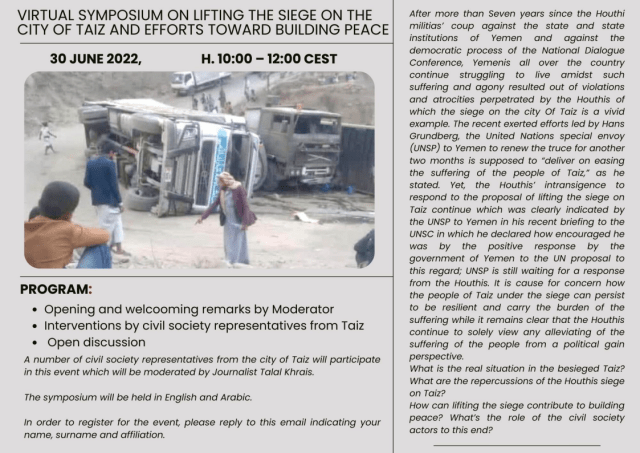SpecialEurasia attended the Virtual Symposium on Lifting the Siege on the city of Taiz in Yemen

On June 30th, 2022, SpecialEurasia and Assadakah organised the Virtual Symposium on “Lifting the Siege on the city of Taiz and efforts toward building peace” to focus the attention of media, politicians and experts on the Yemen civil war and the harsh conditions the local population is experiencing.
After more than seven years since the Houthi militias’ coup against the state and state institutions of Yemen and the democratic process of the National Dialogue Conference, Yemenis all over the country continue struggling to live amidst such suffering and agony resulted out of violations and atrocities perpetrated by the Houthis of which the siege on the city of Taiz is a vivid example.
The recent efforts led by Hans Grundberg, the United Nations special envoy (UNSP) to Yemen, to renew the truce for another two months is supposed to “deliver on easing the suffering of the people of Taiz”, as he stated. Yet, the Houthis’ intransigence to respond to the proposal of lifting the siege on Taiz continue, which was indicated by the UNSP to Yemen in his recent briefing to the UNSC in which he declared how encouraged he was by the positive response by the government of Yemen to the UN proposal to this regard; UNSP is still waiting for a response from the Houthis. It is cause for concern how the people of Taiz under the siege can persist in being resilient and carrying the burden of suffering. At the same time, it remains clear that the Houthis continue to solely view any alleviating of the suffering of the people from a political gain perspective.
Talal Khrais, a Lebanese journalist for the National News Agency (NNA) and the foreign relations manager of the association Assadakah, moderated the event attended by Italian and international journalists, geopolitical analysts, security experts, NGOs’ advisers and practitioners who listened to the speeches of Yemeni people who are working and covering the situation of Taiz and the humanitarian crisis in Yemen. Indeed, the United Nations estimated that the Yemen Civil War caused 377,000 victims. Over 150,000 people, including thousands of civilians, have been killed in the fighting. Today’s online Symposium was an effort to attract media and international attention to the siege of the city of Taiz.
The war in Yemen has become the world’s largest humanitarian crisis. 23.4 million Yemenis, about 75% of the total population, need emergency assistance, according to United Nations figures. Last year alone, the conflict left more than 2,500 civilians dead or injured, forcing 300,000 citizens to flee their homes and the horror of war. In total, since 2015, the number of displaced people has risen to 4.3 million. Despite the efforts of the United Nations and other international organisations to achieve peace in the country and end years of violence, the war in Yemen has become entrenched, and there is no sign of a cessation of hostilities.
Ahmed Basha, an activist and a journalist who has worked in Taiz from the beginning of the war until today, stressed that Taiz, a city in central Yemen, is besieged by Houthi rebels and practically cut off from the rest of the country. The city of Taiz has been isolated from the rest of Yemen since April 2015, when the Houthis’ militias started their siege and cut off any possible connection and way of transport. Since Taiz was under siege, the local population was forced to move by foot or on single-track mountain roads. The prolonged Houthis’ siege has affected the lives of local citizens and their access to food and medicines.
Ahmed Basha added that:
“Before the siege, it took 5 minutes to leave Taiz, now it takes more than 6 hours, the same as moving from one neighborhood to another…the biggest concern for the citizens is the thousands of landmines disseminated in the city.”.
Dr Mansoor Alwaziy highlighted the critical health situation in the city because medicines and treatments are still lacking. Hospitals, including cancer centres, have been bombed. The doctor has also narrated the critical situation during the COVID-19 pandemic, which aggravated the health situation in Taiz.
Mohammed Al-Rumim, a journalist from Taiz who is currently working for IHA Ihlas News Agency, expressed his concern about the security and health situation in the city. He also reported that in 2017 a military unit was formed. Currently, the city has seven military brigades registered with the Ministry of Defense and the Yemeni Army. They defend Taiz but lack sufficient weapons.
Previously, SpecialEurasia met in Oman during the 31st World Congress of IFJ Fatima Mutahar, the representative of the journalists of Yemen and Head of Activities Committee and Executive Director, who described a worrying situation in the country affected by an ongoing humanitarian and social crisis. Mutahar reported severe conditions in Yemen caused by hunger, a widespread problem, and the lack of food, health service and electricity (Media, society, and geopolitics in the Middle East: the case of Syria, Yemen, and Iraq).
Author: Silvia Boltuc, SpecialEurasia Managing Director and project manager of the “Middle East Monitoring” program.
